How your call center agents handle customers can be the difference between a happy customer and an angry tweet. A call center knowledge base can bridge this gap.
It serves as a central repository of all critical information, from troubleshooting guides and FAQs to policies and product details. It tackles long hold times, inconsistent information, and the all-too-common agent scrambling to find answers.
According to a study by KMPG, 90% of consumers worldwide consider issue resolution their most crucial customer service concern.
In this blog, we will explore the benefits of a call center knowledge base and some best practices for setting one up effectively. We will also discuss how you can choose the best call center knowledge base software for your team.
What Is a Call Center Knowledge Base?
A call center knowledge base is a centralized digital repository of information that call center agents use to assist customers efficiently.
It is an organized resource center that provides quick access to structured data, like product details, service procedures, troubleshooting guides, customer service policies, and frequently asked questions.
The primary objective of a call center knowledge base is to ensure that all agents provide consistent and accurate information to customers. This enhances support quality while reducing response times and improving overall customer satisfaction.
For example, when a customer calls in complaining about a recently purchased malfunctioning product. Instead of unnecessarily putting the customer on hold to seek answers or escalating the issue, the call center agent can quickly access the knowledge base and offer relevant solutions
The agent can find a step-by-step troubleshooting guide specific to that appliance model within seconds. Following the guide, the agent instructs the customer on how to resolve the issue.
Why Does Your Call Center Need a Knowledge Base?
A call center knowledge base enables customer support teams to lower churn rates, reduce call volumes, and train inexperienced agents. Here’s why your call center needs a knowledge base:
Increased Agents’ Efficiency
A call center knowledge base reduces the time agents spend searching for information, serving as a one-stop place for answers. Reduced wait times and quicker resolutions directly affect customer satisfaction positively.
When agents have quick access to the required information, they can handle calls faster and minimize the overall call handling time, allowing them to assist more customers in less time.
Consistency in Customer Support
Consistency is essential to maintain trust and reliability with customers. A centralized call center knowledge base ensures all agents have the same information, bringing uniformity in customer responses.
This helps build a professional image of the call center and reduces the margin of error, as every support professional follows the same guidelines and procedures.
Enhanced Agent Training & Onboarding
A contact center knowledge base makes training new agents easier and more effective. New support professionals can independently study the processes and product information, streamlining the onboarding process and helping them become more proficient.
Also, having a well-documented resource to refer to can help new agents feel more confident and reduce their dependency on supervisor assistance.
Improved Customer Satisfaction
Providing quick and accurate responses helps increase customers’ overall satisfaction with the service. A call center knowledge base helps agents provide high-quality support by enabling them with all the necessary tools and information at their fingertips.
Lower Training Costs
Creating and maintaining a comprehensive knowledge base can reduce the time and resources spent on training.
As the knowledge base holds extensive information and answers to frequently asked questions, the need for repetitive, comprehensive training sessions is minimized.
This allows the organization to allocate resources more efficiently and focus on enhancing other customer service areas.
Support for Complex Issues
When customers face complex issues, a comprehensive knowledge base can guide support executives through complicated troubleshooting procedures or policy explanations.
This ensures that all customers, regardless of their problems’ complexity, receive the help they need to resolve their issues satisfactorily.
What Are the Best Practices for Creating a Call Center Knowledge Base?
Creating a comprehensive call center knowledge base involves strategic planning and team collaboration. Here are some best practices you can streamline the process through a series of refined best practices:
Analyze Frequent Customer Queries
Identify and analyze the most common inquiries and questions customers frequently bring to your call center team.
For example, if multiple customers have queries about password resets, the system highlights this as a frequent query, helping the team to optimize related articles or create targeted guidance to efficiently address common concerns.
This step helps focus your knowledge base on the most relevant content, ensuring it addresses customer needs and reduces call volumes for repetitive inquiries.
Involve Key Stakeholders in Content Development
Collaborate with stakeholders from different departments, like customer service, technical support, and IT, to collect diverse insights and ensure the content covers all necessary aspects of your services and products.
This comprehensive approach helps create a more effective and encompassing knowledge base.
Structure Content for Optimal Usability
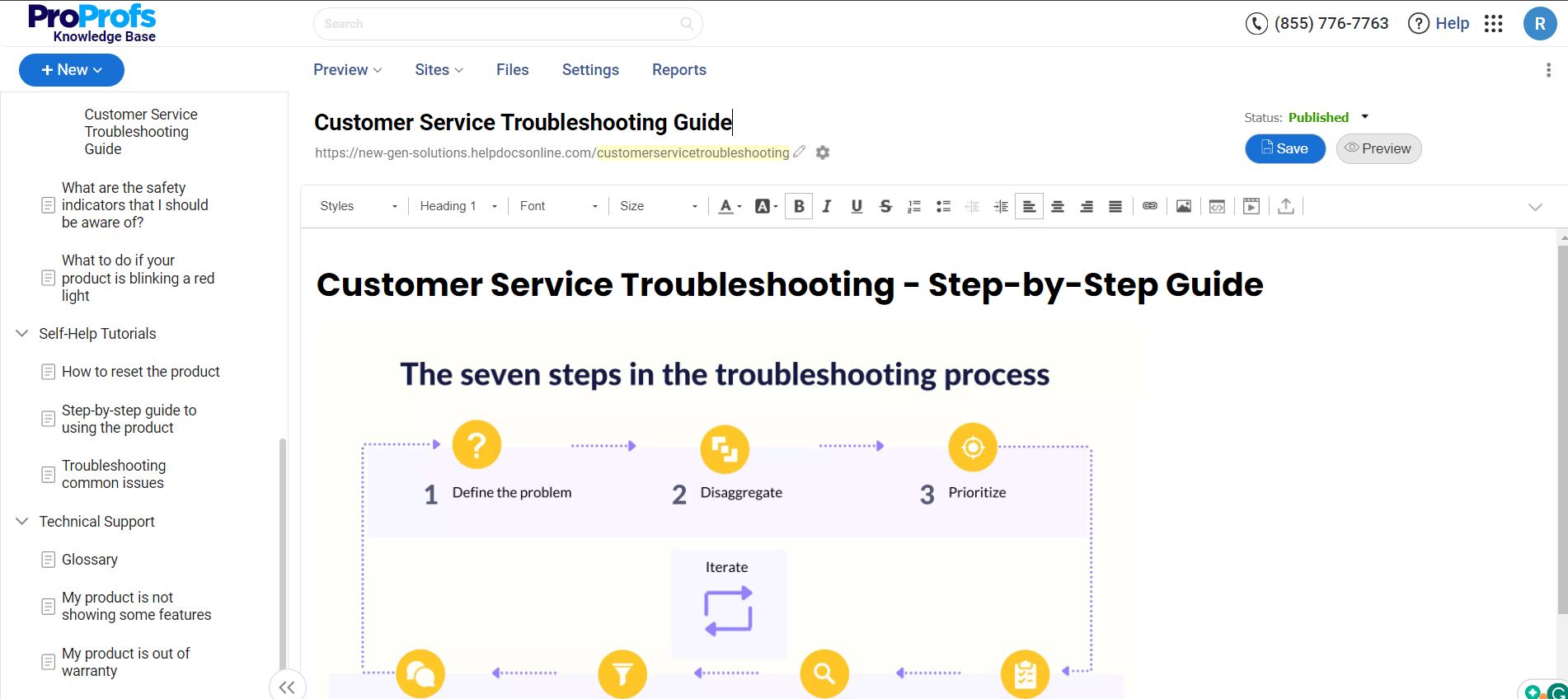
Organize the knowledge base content in a logical manner and classify related topics together to facilitate easier navigation.
Well-organized information helps support agents quickly find the necessary information without unnecessary searching.
Ensure Content Clarity & Maintain Accuracy
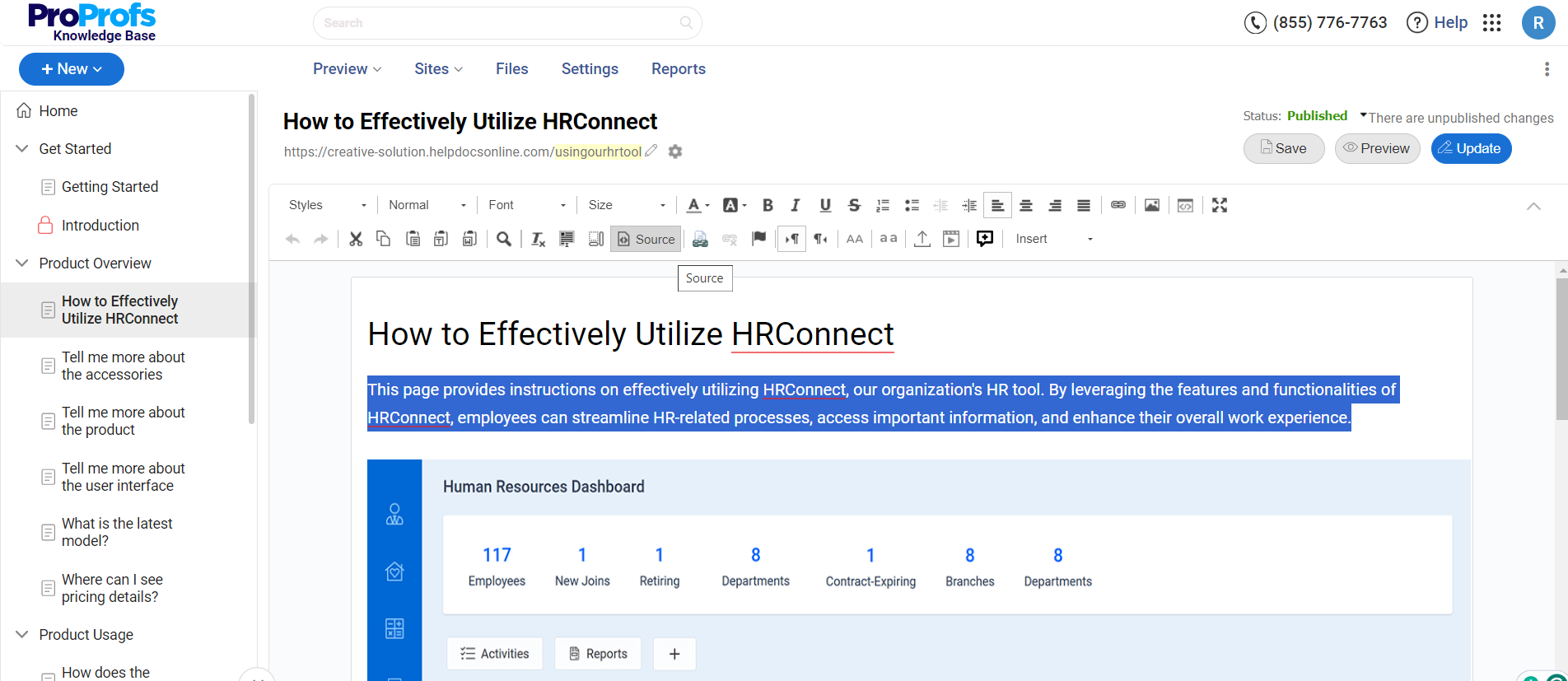
To prevent misunderstandings, write all knowledge base content in clear, concise, and simple language.
Regularly update the content to reflect the latest product updates, policy changes, and procedural adjustments. Accurate, up-to-date content is crucial for maintaining the reliability of your knowledge base.
Improve Findability With Advanced Search Features
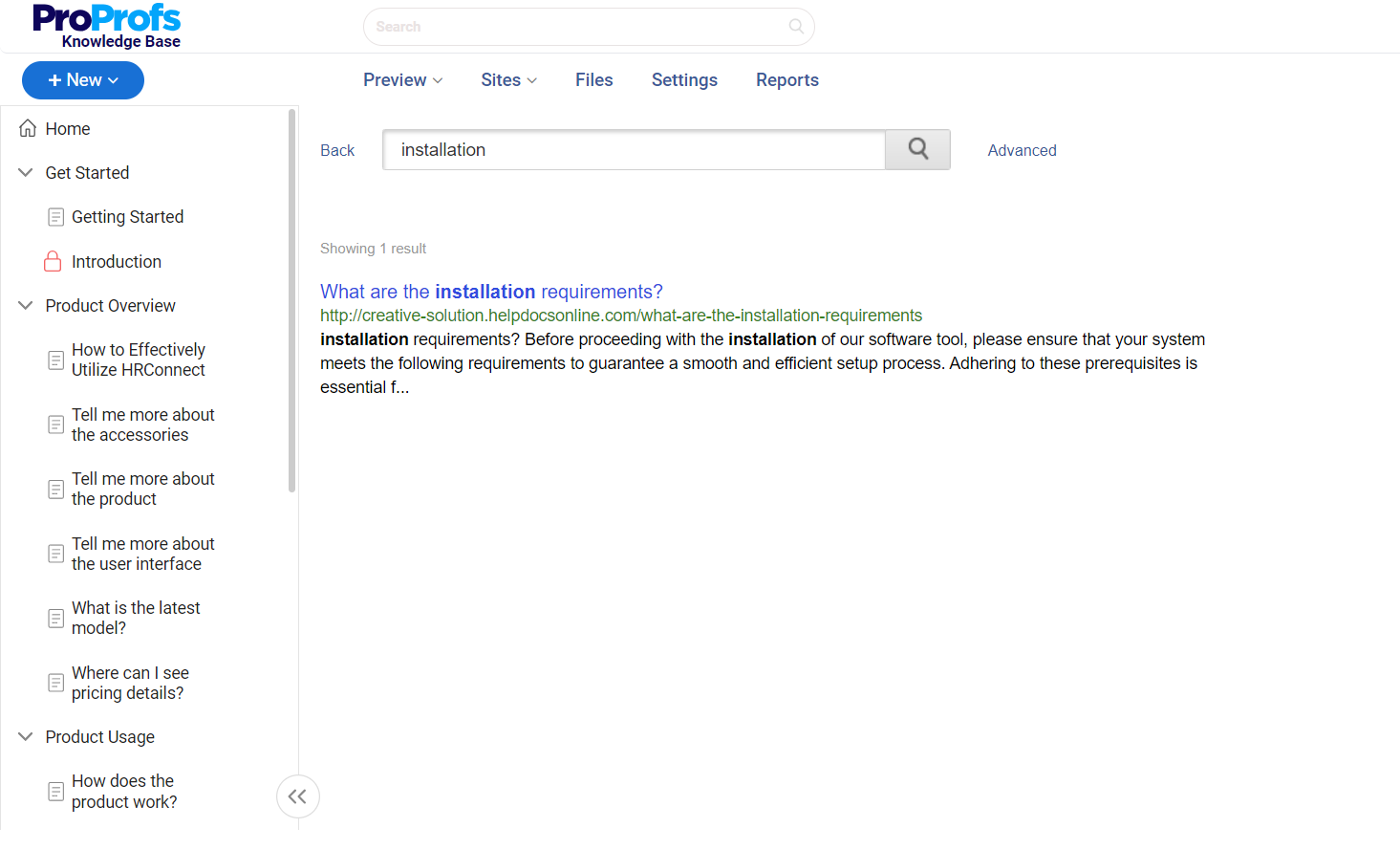
Implement robust search functionality that allows agents to search for information using keywords easily.
This feature should support advanced search techniques to help refine the results, ensuring agents can find relevant information swiftly.
Incorporate Multimedia to Improve Understanding
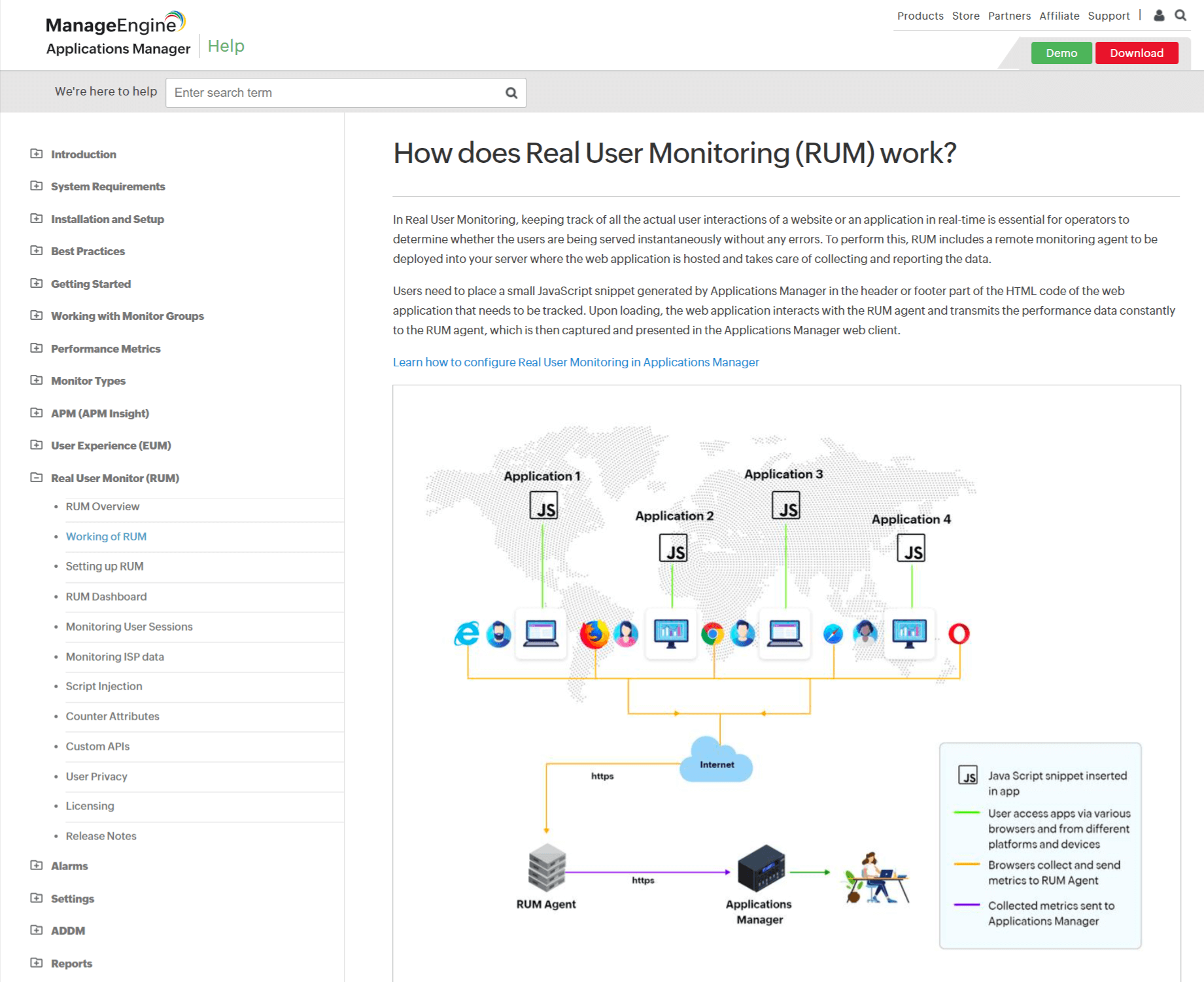
Enhance the knowledge base articles with relevant images, videos, and diagrams. Visual elements can enhance the comprehension of complex information, making it easier for agents to understand and convey solutions to customers.
Ensure Accessibility & Offer Extensive Training
Adhere to accessibility standards to ensure the knowledge base is accessible to everyone, including those with disabilities.
Provide thorough training for agents on effectively using the knowledge base. This includes navigating the platform, utilizing search functionalities, and applying the information in customer interactions.
Set Up a Continuous Feedback Loop & Monitor Impact
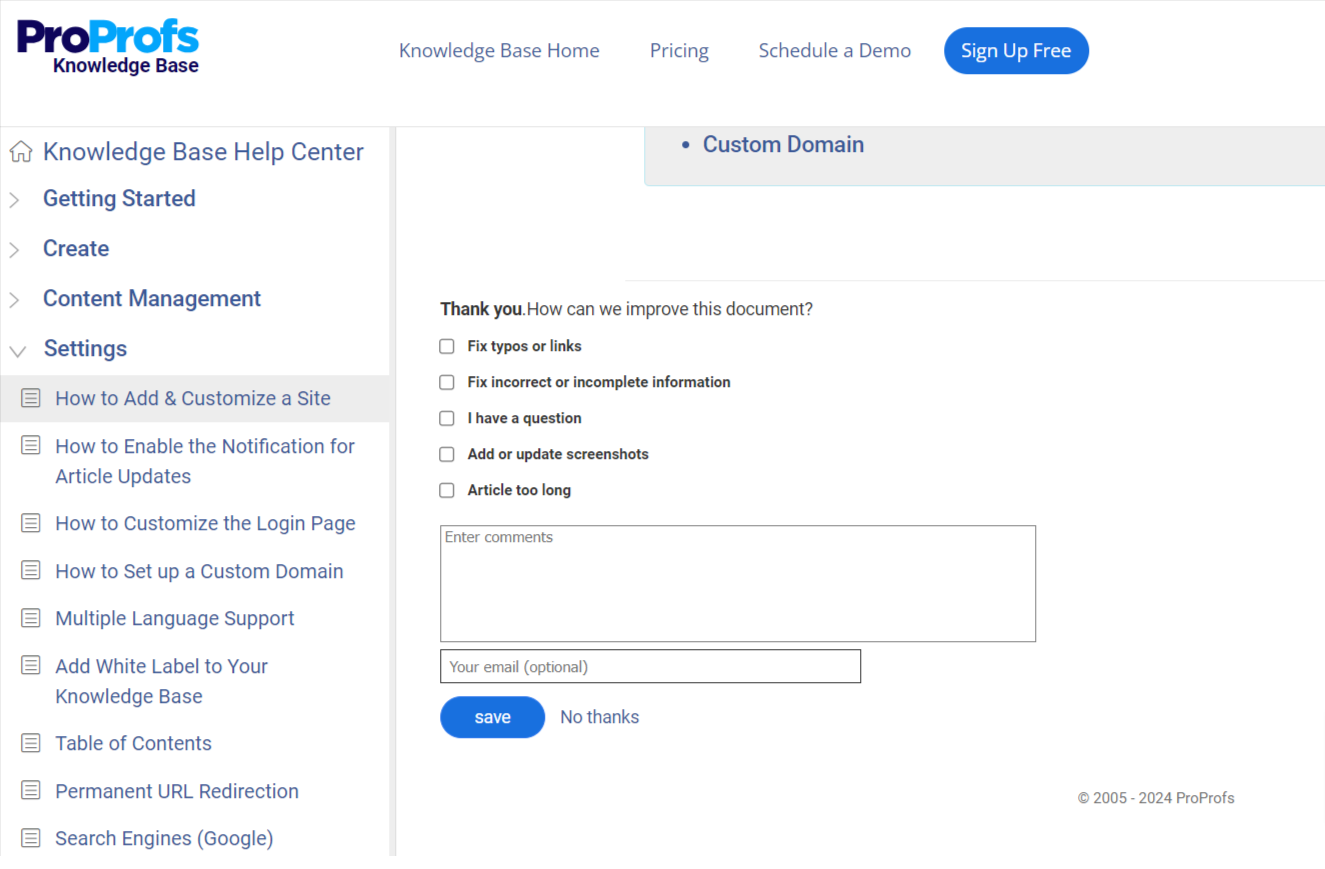
Implement mechanisms for agents to provide feedback on the knowledge base’s usefulness and the accuracy of its content. Use this feedback to improve the knowledge base continuously.
Monitor how the knowledge base impacts critical performance metrics such as average handling time, first call resolution rates, and customer satisfaction to gauge its effectiveness and identify areas for further improvement.
How to Choose the Right Call Center Knowledge Base Software
Choosing the best call center knowledge base software can help your support team deliver exceptional customer service. Here are vital factors you should consider:
- Ease of Use: Choose a platform with an intuitive interface that your agents can navigate easily. Simplicity in design will reduce training time and help agents find information swiftly during calls.
- Intelligent Search Functionality: The tool should have a powerful search engine allowing agents to locate the necessary information quickly. Features like predictive search, filtering options, and natural language processing enhance search capabilities.
- Integration Capabilities: The platform should seamlessly integrates with your existing call center tools, like CRM systems and ticketing platforms. Integration promotes a smooth workflow and centralizes information, making it easier for agents to access all they need in one place.
- Customization Options: Look for a tool that allows you to customize the knowledge base to fit the specific needs of your call center. Customization can include:
- Branding options
- The ability to modify content layouts
- The creation of unique user roles.
- Content Management Features: The platform should offer robust content management tools that facilitate easy creation, editing, and organization of knowledge articles.
Features like version control, audit trails, and permission settings are essential for maintaining the integrity and security of your content.
- Scalability: The software should be able to scale with your organization. As your business grows, your knowledge base will need to expand to cover more products or services and handle increased usage without performance issues.
- Analytics & Reporting: The software should provide detailed analytics and reporting capabilities. Insights into how your knowledge base is being used can help you understand which areas are most effective and where improvements are needed.
- Support & Training: See if the software provider offers comprehensive training and reliable customer support to assist you with setup, maintenance, and troubleshooting.
- Security & Compliance: The software should meet security standards and compliance requirements, mainly if you handle sensitive customer information. Look for features like data encryption, secure access controls, and audit logs.
- User Feedback Mechanisms: User feedback is invaluable to collect and analyze user feedback directly through the software. This feature allows you to continually refine and improve your knowledge base based on real user experiences.
FREE. All Features. FOREVER!
Try our Forever FREE account with all premium features!
Optimize Support Agents’ Efficiency With Call Center Knowledge Base
A call center knowledge base is more than just a repository of information; it has the potential to transform the efficiency and effectiveness of your customer service operations.
Implementing logical content structuring, regular updates, and ongoing training ensures that your knowledge base remains valuable for your team and customers.
ProProfs Knowledge Base combines ease of use, intuitive interface, and advanced search capabilities to make life easier for support professionals. It also offers robust analytics to improve canned responses and identify more areas for improvement. Explore it more to see how it can drive your call center’s success.
 Tips
Tips
We’d love to hear your tips & suggestions on this article!
FREE. All Features. FOREVER!
Try our Forever FREE account with all premium features!

 We'd love your feedback!
We'd love your feedback! Thanks for your feedback!
Thanks for your feedback!







